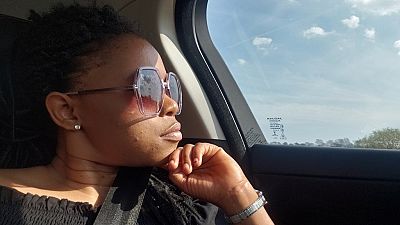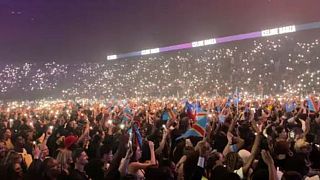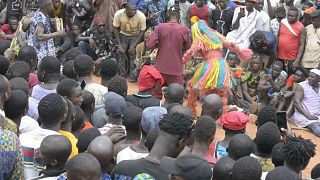Cameroon
When the COVID-19 pandemic struck, many people were locked up in places away from home. Few had the option of returning home, whiles for others it was a case of staying put for as long as the virus remained a threat.
In the weeks that followed especially through much of March and April, governments around the world imposed lockdowns. Sole aim of containing spread of the virus as authorities find ways to better control it.
Emilia Nkengmeyi, a Cameroonian journalist was one of those who was away from home, without the option of returning home. She had been in the United Kingdom for over 6 months as of March 2020.
“I am undertaking a Masters course here in the UK. It’s a one year course so I am officially expected to finish by September,” she told Africanews via a whatsapp interview.
She shared experiences of being locked out and in a lockdown spanning how she coped with the time out, social support systems and support from her school (University of Leicester) as well as how she connected with friends and family back home.
1. How are you coping with the lockdown?
It was a bit hard in the beginning because I had to abruptly put so many things on hold. I had several assignments I was working on but couldn’t use the library and online resources couldn’t give me as much as I wanted.
Working too from home requires a lot of discipline and self-consciousness and it took me some time to adjust to all this.
2. How did you prepare for the lockdown?
Well! I am was completely unprepared for the lockdown because I really hoped things wouldn’t get this bad. But when it came I took the first two days to stock up the house.
Thank God we are allowed to use the supermarkets. I used the next few days to rearrange my program in between house chores and school work
3. How was a typical day like before the lockdown?
It’s usually a completely busy day for me. I had lectures and seminars almost everyday in a week. I would also use the school library during free hours. Sometimes I left home in the morning and only returned in the evening.
And weekends were even more busier, I would travel around visiting friends and sometimes attend parties.
4. What are your biggest fears?
My biggest fear would’ve been a complete disruption in my school program. But I am lucky the lockdown came almost at the end of course work. But I still fear, I may not be able to complete dissertation on time if this continues.
However, I have friends whose programs have completely been disrupted especially those who had to undertake internships abroad or in the UK as part of their courses. Some had very practical courses that could not be done effectively online.
5. How do you socialize in these times?
Personally, I try to attend Webinars and online trainings. We also have groups created specifically to help us pass through these trying times.
We constantly check on each other. We encourage ourselves to be more active indoors. Record ourselves doing sports and share with others and discuss topics which could help each other.
Updates on the UK lockdown situation, case file as of May 6
March 23: PM Johnson imposes full lockdown starting 24th for three weeks
April 16: Extension announced by acting PM Dominic Raab another three weeks
April 30: PM Johnson announces relaxing of measures starting May 4 ahead of May 7 deadline
Confirmed cases = 194,990
Death toll = 29,427
Number of tests = 1.3 million plus
Active cases = 165,219
The UK is the world’s fourth most impacted country behind the US, Spain, Italy, according to Worldometer website
6. Are friends and family back home worried and why or why not?
Mum is particularly not worried because we talk almost every day, she knows me to be very cautious so I guess that reassures her.
But I think she would have been very worried if she wasn’t able to get through to me. Friends have been very supportive. I get series of calls and messages from loved ones and most of them feel relieved knowing that i am just fine.
7. What measures have school authorities taken to support students? How are your studies continuing amid the lockdown?
School authorities have been very supportive. All lectures and face to face teachings had been moved online 2 weeks before the official lockdown. We receive daily update from school on the virus and measures that are being put in place.
We have the support team at our disposal in case of any difficulties. And all assignment deadlines have been extended by 2 weeks. Students who cannot return to their home countries at this time and are at school accommodations are effectively being taken care of.
Authorities ensure they have access to daily needs. The semester has been officially closed but we still have access to personal tutors and some lecturers.
8. Do you think government took the right decision with a lockdown and why?
The country has been invaded by an unknown virus and no one could say for certain the extent to which we could be affected.
I think the lockdown was necessary not only to reduce the spread, but also to give authorities the time to figure out how best to handle the situation.
The Prime Minister was very reluctant to lockdown so I guess if he did at the end of the day, he had good reason to do so. It was a hard decision to take due to economic impact on the economy but am glad lives were considered a priority.
9. Are you following developments back home, what are your views on the virus management?
I try as much as I can to get daily update on the situation back home. It’s very worrying I must say. The number of cases is rising and other regions are also getting affected and I fear it may get worse.
I believe the government took an early and timely step to shutdown borders but we are not properly managing the few cases we have reason for the spread. We need more sensitization than we already have.
I see the minister of health tweeting constantly but the question is how many people use and have access to Twitter. I understand at the moment we lack technical equipment so the least we can do is go down there and sensitize the people.
But I guess this is not work for the government alone to do, we all need to join them in this fight. We can only win through collective efforts. I see some civil society organizations mobilizing their communities, providing homemade hand sanitizer and must commend them for their involvement in fighting this.
10. What is the saddest coronavirus news you have seen?
I was really hit when it was reported that close to 900 people died in a day in Italy. I have never been that terrified since the outbreak. I feared losing someone close to the virus.














00:49
Teachers strike shuts down schools across Cameroon
02:35
Sudanese Refugee Children Find Hope in Libyan School
Go to video
The Okwelians: Unlocking New Economic Paths for Cameroon [Business Africa]
01:58
Uncertainty surrounds school reopening in Goma
02:04
Cameroon sugarcane strike turns violent over wages
11:03
Five years later, is the AfCFTA already failing? {Business Africa}